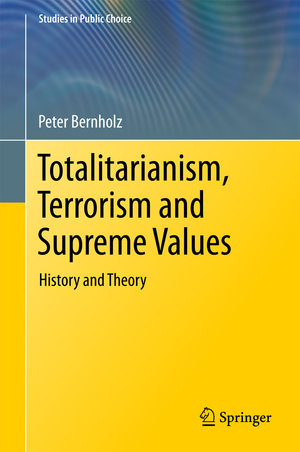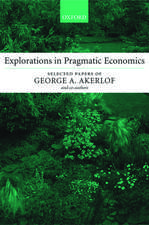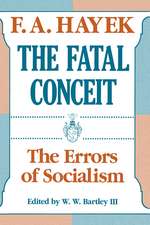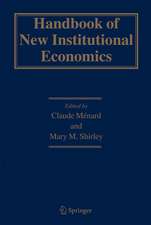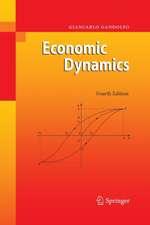Totalitarianism, Terrorism and Supreme Values: History and Theory: Studies in Public Choice, cartea 33
Autor Peter Bernholzen Limba Engleză Hardback – 8 iun 2017
Applying a rational choice perspective, this book presents a dynamic theory of the evolution of totalitarian regimes and terrorism. By demonstrating that totalitarian regimes rest on ideologies involving supreme values that are assumed to be absolutely true, the author identifies the factors that lead to totalitarian regimes, and those that transform or abolish those regimes with time. The author addresses different ideologies, such as National Socialism, Communism, and religious movements; examines numerous historical cases of totalitarian regimes; and develops a formal, mathematical model of totalitarianism in the book’s closing chapter.
| Toate formatele și edițiile | Preț | Express |
|---|---|---|
| Paperback (1) | 690.94 lei 6-8 săpt. | |
| Springer International Publishing – 2 aug 2018 | 690.94 lei 6-8 săpt. | |
| Hardback (1) | 697.00 lei 6-8 săpt. | |
| Springer International Publishing – 8 iun 2017 | 697.00 lei 6-8 săpt. |
Din seria Studies in Public Choice
-
 Preț: 542.84 lei
Preț: 542.84 lei - 18%
 Preț: 958.38 lei
Preț: 958.38 lei - 20%
 Preț: 579.92 lei
Preț: 579.92 lei - 18%
 Preț: 780.82 lei
Preț: 780.82 lei -
 Preț: 395.09 lei
Preț: 395.09 lei - 5%
 Preț: 370.58 lei
Preț: 370.58 lei -
 Preț: 381.81 lei
Preț: 381.81 lei - 18%
 Preț: 1228.77 lei
Preț: 1228.77 lei - 15%
 Preț: 637.46 lei
Preț: 637.46 lei - 18%
 Preț: 942.63 lei
Preț: 942.63 lei - 15%
 Preț: 640.71 lei
Preț: 640.71 lei - 15%
 Preț: 633.53 lei
Preț: 633.53 lei - 18%
 Preț: 945.62 lei
Preț: 945.62 lei - 20%
 Preț: 560.55 lei
Preț: 560.55 lei - 18%
 Preț: 947.50 lei
Preț: 947.50 lei - 15%
 Preț: 632.37 lei
Preț: 632.37 lei - 15%
 Preț: 635.15 lei
Preț: 635.15 lei - 15%
 Preț: 634.49 lei
Preț: 634.49 lei - 15%
 Preț: 635.01 lei
Preț: 635.01 lei - 15%
 Preț: 638.89 lei
Preț: 638.89 lei -
 Preț: 381.81 lei
Preț: 381.81 lei - 15%
 Preț: 640.88 lei
Preț: 640.88 lei -
 Preț: 385.62 lei
Preț: 385.62 lei -
 Preț: 393.13 lei
Preț: 393.13 lei - 15%
 Preț: 586.70 lei
Preț: 586.70 lei -
 Preț: 389.31 lei
Preț: 389.31 lei - 15%
 Preț: 643.84 lei
Preț: 643.84 lei - 18%
 Preț: 727.00 lei
Preț: 727.00 lei
Preț: 697.00 lei
Preț vechi: 820.00 lei
-15% Nou
Puncte Express: 1046
Preț estimativ în valută:
133.39€ • 138.74$ • 110.12£
133.39€ • 138.74$ • 110.12£
Carte tipărită la comandă
Livrare economică 14-28 aprilie
Preluare comenzi: 021 569.72.76
Specificații
ISBN-13: 9783319569062
ISBN-10: 3319569066
Pagini: 160
Ilustrații: XII, 160 p. 11 illus.
Dimensiuni: 155 x 235 mm
Greutate: 0.42 kg
Ediția:1st ed. 2017
Editura: Springer International Publishing
Colecția Springer
Seria Studies in Public Choice
Locul publicării:Cham, Switzerland
ISBN-10: 3319569066
Pagini: 160
Ilustrații: XII, 160 p. 11 illus.
Dimensiuni: 155 x 235 mm
Greutate: 0.42 kg
Ediția:1st ed. 2017
Editura: Springer International Publishing
Colecția Springer
Seria Studies in Public Choice
Locul publicării:Cham, Switzerland
Cuprins
Introduction.- Ideologies of National Socialism, Communism, Christianity and Islam.- The Theory of Totalitarianism and Mature Ideocracy, Part I: Evolution and Development.- Further Historical Cases of Totalitarian Regimes.- Mature Ideocracies.- The Theory of Totalitarian Regimes, Part II: Stability, Further Development and Demise.- The Constitution of Totalitarianism.- Terrorism as a Means to Win or to Regain Secular Power.- Economic and Political Problems Facing Ideocracies.- Art and Science in Totalitarian Regimes and Mature Ideocracies.- A Formal Model of Totalitarianism.- Summary: Supreme Values, Totalitarian Regimes and Mature Ideocracies.
Recenzii
“An extraordinary piece of research that not only is pleasant to read, but—more important—offers content that should be carefully studied by academics—both lecturers and students—, policy makers and by any responsible citizen who wants to be fully aware of the menaces that threaten democracies. … All in all, the book is highly recommended reading … .” (Thomas Baumert, Constitutional Political Economy, Vol. 32, 2021)
“Bernholz describes supreme-value ideologies that have existed over the ages. He stays literally close to home in describing the supreme values of Adolf Hitler and German National Socialist ideology. … This book is necessary reading for researchers of defense strategy and the economics of defense, but above all for the politicians and administrators to whom we entrust our safety.” (Arye L. Hillman, Public Choice, July, 2018)
Notă biografică
Assistant Professor at Universität Frankfurt 1964-66, Ordinarius (Full Professor) at Technische Universität Berlin 1966 to 1971. Since 1971 Ordinarius for Economics, especially for Economic Policy and for Monetary and International Economics, and Institute Director at Universität Basel, Switzerland. Dean of the Faculty of Philosophy and History 1982-83. Guest professor at MIT 1969, Virginia Polytechnic Institute 1974 and 1978, Stanford University 1981, University of California LA 1986/87, Australian National University, Canberra, 1993, University of California Irvine 1998, Universita degli Studi di Roma “La Sapienza” 2000, Research Fellow of the Center for Study of Public Choice, George Mason University, Fairfax, Virginia.
Corresponding Member of the Bavarian Academy of Sciences. Dr. rer. pol. h. c. of Universitaet Konstanz 2000, Universitaet Freiburg 2011, Germany. Fellow of Wissenschaftskolleg Berlin (Center for Advanced Studies) 2000-2001. President of European Public Choice Society from 1974 to 1981; Member Academic Advisory Board of the German Minister of Economics since 1974; Member of the Macroeconomic Policy Group of the European Union from 1988 to 1990; Co-Founder of the European Constitutional Group 1992.
Corresponding Member of the Bavarian Academy of Sciences. Dr. rer. pol. h. c. of Universitaet Konstanz 2000, Universitaet Freiburg 2011, Germany. Fellow of Wissenschaftskolleg Berlin (Center for Advanced Studies) 2000-2001. President of European Public Choice Society from 1974 to 1981; Member Academic Advisory Board of the German Minister of Economics since 1974; Member of the Macroeconomic Policy Group of the European Union from 1988 to 1990; Co-Founder of the European Constitutional Group 1992.
Textul de pe ultima copertă
Applying a rational choice perspective, this book presents a dynamic theory of the evolution of totalitarian regimes and terrorism. By demonstrating that totalitarian regimes rest on ideologies involving supreme values that are assumed to be absolutely true, the author identifies the factors that lead to totalitarian regimes, and those that transform or abolish those regimes with time. The author addresses different ideologies, such as National Socialism, Communism, and religious movements; examines numerous historical cases of totalitarian regimes; and develops a formal, mathematical model of totalitarianism in the book’s closing chapter.
Caracteristici
Presents a dynamic theory of the evolution of totalitarian regimes Develops a formal, mathematical model of totalitarianism Includes numerous historical examples of ideocratic regimes Includes supplementary material: sn.pub/extras
